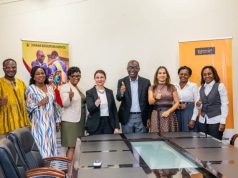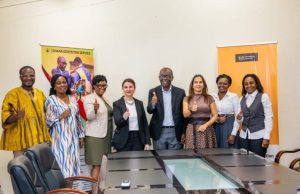GIFEC, an agency of the Ministry of Communications and Digitalisation of Ghana, was established in 2004 by His Excellency the Former President John Agyekum Kufuor, as a Universal Access Fund to collaborate and innovate in bridging the digital divide between unserved and underserved communities in Ghana.
As a government agency responsible for ensuring universal access to electronic communications, GIFEC has been delivering training covering basic and intermediate digital skills.
It also has the capacity to reach communities across the country mainly through its 200 community centres, zonal offices and partnerships with local institutions.Speaking at a durbar during the commissioning of three Ghana Rural Telephony and Digital Inclusion Sites (GRT&DIP) in Effiduase-Awaham, Anumso and Bouya, in the Sekyere East Municipal on Saturday 16th November, 2024, Mrs. Eva Andoh-Poku, acting Administrator for GIFEC, indicated that GRT&DIP seeks to extend mobile telephone service coverage to areas where access is limited and where licensed operators have been unable or unwilling to expand due to commercial or other constraints. According to her, to fulfill their mandate and facilitate the provision of basic telephony across the country, the Government of Ghana, under the leadership of His Excellency Nana Addo Dankwa Akufo-Addo and His Excellency Dr. Mahamudu Bawumia, secured funding in 2019 to deploy 2,016 Rural
According to her, to fulfill their mandate and facilitate the provision of basic telephony across the country, the Government of Ghana, under the leadership of His Excellency Nana Addo Dankwa Akufo-Addo and His Excellency Dr. Mahamudu Bawumia, secured funding in 2019 to deploy 2,016 Rural
Telephony Sites, as part of the GRT&DIP.
Mrs. Eva Andoh-Poku, reemphasized that, the project aims to provide mobile network coverage to an estimated 3.4 million additional citizens.
“While telecommunications have spread significantly, telephony infrastructure remains concentrated in major economic centers. Thus, telecommunication and ICT facilitie, now essential services and must be accessible throughout the country.
It is worth noting that between 2009 and 2016, under the previous government, 106 rural sites were established nationwide,” She noted.
The Acting Administrator future disclosed that, since the GRT&DIP began in 2020, 1,440 sites have been constructed, with 812 activated to provide 3G voice and data services. This expansion, she said impacts the lives of over 1.5 million Ghanaians.
“Significantly, the GRT&DIP network allows citizens to connect through the National Roaming Initiative, regardless of their mobile network provider.
As we continue to expand access, it is vital to protect and maintain our existing investments in beneficiary communities for sustained collective benefits,” She charged.
Another arm of the project is the Cyberlabs Programme which was created to enhance ICT access by providing equipment such as computers, printers, scanners, and projectors to schools, institutions, and communities, facilitating ICT teaching, learning, and ICT-enabled education.
“As part of this program, we have established 281 Community ICT Centers (CICs) nationwide, which provide community-wide access to ICT services, including internet connectivity, ICT literacy training, community information, and business services.
Since 2017, the Cyberlabs Programme has benefited 1,011 schools, including, 603 Junior High Schools, 90 Basic School, 89 Senior High Schools , 19 Tertiary Institutions, 10 Nursing and Colleges of Education.
In the Ashanti Region alone, we have built 33 CICs in towns such as Bantama, Bekwai, Ejisu, Kodie, and Konongo, and provided computers to 274 schools,” revealed by Mrs. Eva Andoh-Poku.
On tracking the project, the Acting Administrator, underpinned some substantial progress in ICT development GIFEC has made through various initiatives, such as; Coding for Kids project, which has introduced over 20,000 children to basic coding using Scratch, HTML, and Python.
Also in collaboration with UNESCO, they have trained 600 youth in “ICT and Media in Ghana with Efficient Tools for Youth to Counter Extremism (PVE).”
Whereas 81,500 artisans, including mechanics, hairdressers, and market women, and 600 ICT teachers, have received ICT training.
On the Girls in ICT Programme, she said since 2017, GIFEC has supported the Girls in ICT (GIICT) initiative by distributing 1,972 laptops and establishing 97 labs for the schools of the top 10 female students in the program each year.
“So far, 13,981 girls and 1,092 teachers have benefited from training under this initiative, which is key to promoting gender equality and digital skills for girls across Ghana.
Through these efforts, GIFEC continues to empower communities, promote digital inclusion, and support national development,” Mrs. Andoh-Poku, concluded.


















